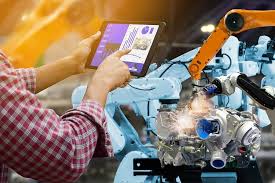The Evolution of Manufacturing Technology
In today’s rapidly advancing world, manufacturing technology plays a crucial role in shaping industries and driving innovation. From the early days of manual labor to the modern era of automation and artificial intelligence, the evolution of manufacturing technology has revolutionized the way products are designed, produced, and delivered to consumers.
One of the key developments in manufacturing technology is the advent of computer numerical control (CNC) machines. These precision tools use computer programs to control machinery and perform tasks with incredible accuracy and efficiency. CNC machines have significantly increased productivity in industries such as aerospace, automotive, and electronics by automating complex processes that were once done manually.
Another groundbreaking advancement is 3D printing technology, also known as additive manufacturing. This innovative process allows manufacturers to create three-dimensional objects layer by layer using digital models. 3D printing has revolutionized prototyping, customization, and small-batch production, enabling companies to quickly bring new products to market with reduced costs and lead times.
Robotics is another area where manufacturing technology has made significant strides. Industrial robots are now commonly used in assembly lines to perform repetitive tasks with speed and precision. Collaborative robots, or cobots, work alongside human workers to enhance productivity and safety in manufacturing environments.
Artificial intelligence (AI) is also playing a growing role in manufacturing technology. AI-powered systems can analyze vast amounts of data to optimize production processes, predict maintenance needs, and improve quality control. Machine learning algorithms are being used to enhance decision-making capabilities and drive continuous improvement in manufacturing operations.
Looking ahead, emerging technologies such as Internet of Things (IoT), augmented reality (AR), and virtual reality (VR) are poised to further transform the manufacturing landscape. These interconnected technologies offer new opportunities for real-time monitoring, remote operation, and immersive training experiences that can revolutionize how products are manufactured.
As we continue to push the boundaries of what’s possible with manufacturing technology, one thing remains clear: innovation will always be at the heart of progress. By embracing new technologies and adapting to changing market demands, manufacturers can stay competitive in a dynamic global economy while delivering high-quality products that meet the needs of consumers worldwide.
Exploring the Role and Impact of Technology in Manufacturing: A Guide to Technologist Functions and Production Advancements
- What does a manufacturing technologist do?
- What kind of technology is used for manufacturing?
- What does production technology do?
- What does manufacturing technology do?
What does a manufacturing technologist do?
A manufacturing technologist plays a pivotal role in the production process by applying their expertise in technology and engineering to optimize manufacturing operations. They are responsible for analyzing production methods, identifying areas for improvement, and implementing innovative solutions to enhance efficiency and quality. From designing production processes to troubleshooting equipment issues, a manufacturing technologist works closely with cross-functional teams to ensure that products are manufactured effectively and meet industry standards. Their diverse skill set in areas such as automation, quality control, and process optimization makes them invaluable assets in driving continuous improvement and innovation within manufacturing facilities.
What kind of technology is used for manufacturing?
Manufacturing technology encompasses a diverse range of tools, machines, and systems designed to improve the efficiency and effectiveness of production processes. This includes traditional machinery like lathes and milling machines, which have been enhanced with computer numerical control (CNC) to automate production. Additive manufacturing technologies such as 3D printing enable layer-by-layer construction of complex parts with materials ranging from plastics to metals. Robotics play a vital role in automating repetitive tasks and can be found on assembly lines across various industries. Artificial intelligence (AI) and machine learning algorithms are increasingly being used for predictive maintenance, process optimization, and quality control. The Internet of Things (IoT) integrates sensors and devices for real-time monitoring and data analysis, while augmented reality (AR) assists in maintenance and training by overlaying digital information onto the physical world. These technologies together create a dynamic ecosystem that drives the modern manufacturing industry.
What does production technology do?
Production technology encompasses a range of tools, techniques, and processes that are utilized in manufacturing to transform raw materials into finished products efficiently and effectively. It involves the utilization of various methods such as machining, casting, welding, and additive manufacturing to produce goods on a large scale while maintaining quality standards. Production technology plays a crucial role in optimizing production processes, improving productivity, reducing costs, and ensuring consistency in product quality. By integrating advanced technologies and automation systems, production technology enables manufacturers to streamline operations, enhance competitiveness, and meet the evolving demands of the market.
What does manufacturing technology do?
Manufacturing technology encompasses a wide range of tools, processes, and systems that are utilized to design, produce, and deliver goods efficiently and effectively. At its core, manufacturing technology aims to streamline production processes, enhance product quality, increase productivity, and reduce costs. From advanced machinery like CNC machines and robotics to cutting-edge software solutions like CAD/CAM systems and automation technologies, manufacturing technology plays a vital role in shaping modern industries by enabling companies to stay competitive in a rapidly evolving global market.

No Responses